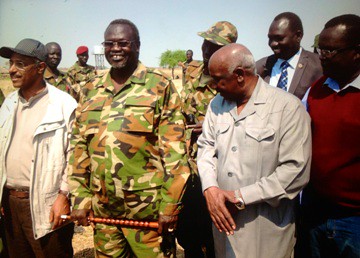
Former Vice-President Riek Machar in South Sudan during mediation. East African leaders are seeking an end to the fighting., a photo by Pan-African News Wire File Photos on Flickr.
South Sudan rebel leader should face treason charge: minister
4:42pm EST
By Carl Odera and Andrew Green
JUBA (Reuters) - South Sudanese rebel leader Riek Machar and six others should be tried for treason for their role in weeks of bloodshed, the justice minister said on Tuesday, threatening to heighten tensions in already troubled peace talks.
Minister Paulino Wanawilla Unago cushioned the blow by saying seven other political figures, arrested after the violence erupted, would be released, partly meeting one of the rebels' demands at the negotiations.
Fighting broke out between rival groups in the presidential guard in the capital Juba in mid December and quickly spread to oil-producing areas, largely along ethnic lines.
President Salva Kiir accused Machar, the vice president he sacked in July, of launching a coup in the world's newest country.
Machar, who is now in hiding, dismissed the allegation, saying Kiir had taken advantage of an outbreak of fighting to round up political rivals.
"Anybody who intends to change a constitutional government or to suspend the constitution or abrogate the constitution by force commits treason," Unago told reporters.
Unago said he believed there was enough of a case to take Machar and his six associates, who include Pagan Amum, the former Secretary General of the ruling Sudan People's Liberation Movement (SPLM), to court.
But first he said the president needed to sanction the treason charge, which carries the death penalty in South Sudan.
"We believe they are going to be answerable for the coup before the court," Unago said.
"What has been alleged about those people ... makes it a treason (offence)".
THOUSANDS KILLED
The violence, the worst in South Sudan since it won independence from Sudan in 2011, has killed thousands of civilians and driven more than half a million from their homes.
Under heavy pressure from regional powers, the United States, the United Nations and other key donors, both sides agreed to meet in neighboring Ethiopia, then on Thursday signed a ceasefire.
But both sides have accused the other of continuing the violence and the discussions have been suspended until February 7.
Unago said that six of the seven being released would remain on bail. They would be handed over to a neighboring state and could still face trial in South Sudan if further investigations linked them to the alleged coup, he said.
A second official said the six would be moved to Kenya.
"Because we didn't have sufficient evidence against them, we are going to make a conditional release on bail," Unago said, adding their transfer to another state was because of concern for their safety.
Diplomats say the deep ethnic, political and personal grievances will be hard to overcome when talks restart.
The South Sudanese government insists a number of other political figures arrested by the government will not be released without a legal process being followed, a possible sticking point.
"If the political detainees are not released by February 7 then I don't see the political talks going anywhere," said a South Sudanese diplomat in Addis Ababa.
"But at the same time you cannot release the suspects without the legal process taking its course."
Washington, the United Nations and South Sudan's neighbors played a central roll in negotiations that ended decades of civil war with Sudan to the north and led to the secession of South Sudan in 2011, and scrambled to stem the latest violence.
South Sudan holds the third-largest oil reserves in sub-Saharan Africa after Angola and Nigeria, according to BP, but remains one of the continent's least developed countries.
(Additional reporting by Edmund Blair and Aaron Maasho in Addis Ababa; Writing by Richard Lough; Editing by Andrew Heavens)
No comments:
Post a Comment